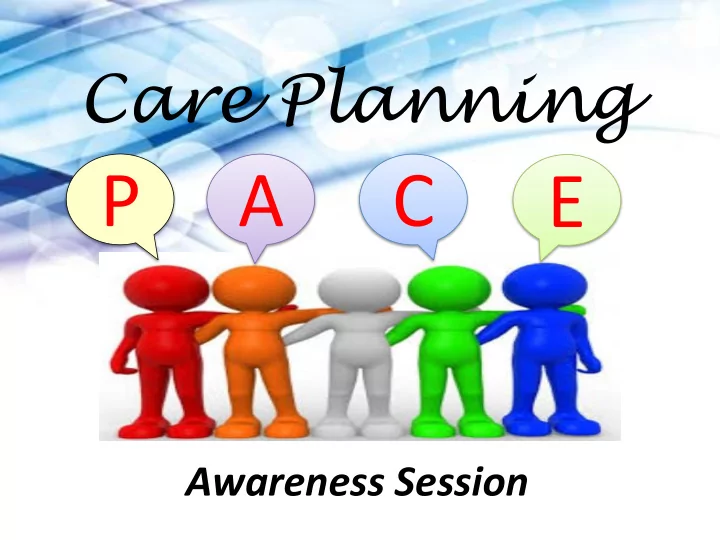

Care Planning P A C E Awareness Session
Origin NIPEC Recording Care Project SINCE 2009…….. Improve the standards of nurse record keeping practice in the region
Recording Care ...... What’s the point?
Why Keep Records I I Int ntegral ral par art o t of p f pra ract ctice ice Evidence of partnership with people in our care Communication Support delivery/continuity of care Evidence clinical judgement/decisions Identifies risks
Requirement Co-production – being person centred Regulatory – NMC Legal - Improves accountability and provides evidence Employer - Policies
What it’s not.....
What it is.....
CARE PLAN
What is a Care Plan
It is.. A written record of the ‘care planning process’. This process identifies the persons needs , plans the nursing intervention to achieve the desired outcomes and evaluates the effectiveness of delivered care. Care planning – Action Care plan – Recording Can be viewed as a negotiated contract laying down both parties’ responsibilities
Care plan should.. be Person-centred Involve person in decision making be in Partnership be Collaborative enable Information Sharing be Regularly Reviewed
Caution…. Over reliance – not questioned Difficultly to keep updated as person changes Constant revision costs time Not always individual Not flexible Reduced critical thinking
Is there a better way The development of the way forward to improve the quality of care planning within the nursing profession began January 2014
START NOV 2014 CARE PLANNING SUMMIT – January 2015 Presentation to EDoNs April 2015 Meetings June, July and August 2015 Product PACE Pilot September 2015 Presentation to EDoNs Nov 2015 Larger Pilot Feb-April 2017 Presented to CNO/ EDoNs July 2016 PROCESS OF PLANNING ROLLOUT
What did the literature tell us Variety models underpin care plans Involving person Highly skilled and family Record keeping not reflective of Dynamic process delivered care Ongoing reflection required Safety issues Complex/ inflexible Difficult to understand
Current practice • Nursing process • Models • Care pathways • Care bundles • Clinical assessment tools
PACE – What's possible Passive recipients PARTNERSHIP EMPOWERMENT Paternalistic INFORMED CONSENT Informed of care SIMPLICITY Comprehensive FACTUAL/CONCISE ‘it wasn’t recorded it wasn’t done’
PACE P ERSON E VALUATION A SSESSMENT PLAN OF C ARE
When to record P - At the beginning of a shift and throughout shift A - Depending on the need - ongoing care/episodes of care/emergency & critical care C - Following assessment of needs E - Throughout the shift, after a plan is in place and the action has been carried out or if unable to be carried out
Champions
Champions Role Motivator Promote awareness Resource Educator WHAT Embracing barriers / Facilitate/ Mentor Monitor HOW Role model Embed Good Change practice culture Evaluator/ Feedback
PACE Educator Train their peers, tailoring this to their area of practice. Can be formal or informal. Run short sessions or work with staff during the shift. Work through resource pack. Feedback on the resources and possible development of new materials such as posters, leaflets. Guide to other resources Become familiar with NIPEC site with resources and tools for practice improvement
Embracing Barriers
BARRIER ENABLER New approach – increase time Given adequate time from to record nurse leaders Inadequate training Adequate training preparation preparation
BARRIER ENABLER Lack of explanations of Given adequate explanation change/expectations Lack of feedback to Facilitate feedback to department level department level. Misunderstanding of PACE Training/Resources Reluctance from patient Explanation
BARRIER ENABLER Lack of training/ preparation Support from NIPEC at all levels Attendance at training workshops. Lack of awareness Involvement of department champions to cascade Resource pack. Training audit tool
BARRIER ENABLER Fear -not writing Training/on going support at enough/change of entire style ward level Fear of legal/professional Addressing these issues repercussions Revalidation Staff attitudes - sceptical Communication / Discussion Challenging department Creative thinking to current environment processes Staff levels Appropriate reporting Understanding
Resources • Resource pack • NIPEC website http://www.nipec.hscni.net/ • NIPEC microsite http://www.nipec.hscni.net/resource- section/improve-record-keeping/ • NMC Code • Standards document
Recommend
More recommend